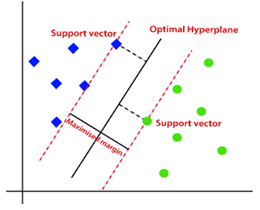PERBANDINGAN ALGORITMA NAÏVE BAYES DAN SVM UNTUK ANALISIS PENYALAHGUNAAN KEJAHATAN CARDING
DOI:
https://doi.org/10.51401/jinteks.v5i1.2231Keywords:
Carding, Machine Learning, Naïve Bayes, and Support vector machine.Abstract
Carding is a type of cybercrime related to banking, or credit cards. This crime is a method of stealing credit card numbers from legitimate websites and spammers and using them for personal gain. Due to the difficulty in identifying this fraud issue, card victims often experience lingering suspicions when attempting to use credit card buying schemes. Based on this problem, researchers hope to be able to analyze card crime using two machine learning algorithms that help detect card crime: Naive Bayes and Support vector machine. Based on the results of our research, we can conclude that both the Naive Bayes algorithm and Support vector machines can be used to accurately predict carding crime exploits. However, support machine algorithms are more accurate than Naive Bayes. The Support Machine Algorithm produces 1's values ??that are 99% higher than Naive Bayes. This is because support vector machine classifiers provide high accuracy and work well.
References
Tata Sutabri, 2012, Komputer dan Masyarakat, Penerbit Andi, Yogyakarta
Tata Sutabri, R. Pandi Selvam, K. Shankar, Phong Thanh Nguyen, Wahidah Hashim, Andino Maseleno, 2019, Machine Learning for Healthcare Diagnostics, Blue Eyes Intelligence Engineering & Sciences Publication, BHOPAL, Madhya Pradesh 462021, IN
Heri Syahputra, 2021, Perancangan Sistem Pakar Untuk Mengidentifikasi Keamanan Transaksi Online Website E-commerce Dengan Menggunakan Metode Certainty Factor, Jurnal Informasi dan Teknologi Ilmiah (INTI)
Fatima Salahdine, Zakaria El Mrabet, Naima Kaabouch, 2022, Phishing Attacks Detection A Machine Learning-Based Approach, Cornell University, New York City.
Fatima Salahdine, Zakaria El Mrabet, Naima Kaabouch, 2022, Phishing Attacks Detection A Machine Learning-Based Approach, Cornell University, New York City.
Wildan Cika Pradana, Mochtar Yahya, Halimahtus Mukminna, 2022, SISTEM DIAGNOSIS PENYAKIT KULIT PADA MANUSIA DENGAN METODE FORWARD CHAINING BERBASIS ANDROID, JINTEKS, Sumbawa.
Mazmur Triputra, Eri Sasmita Susanto, Wilia Ismiyarti, 2019, RANCANG BANGUN APLIKASI KLASIFIKASI PLAGIARISME DENGAN MEMANFAATKAN MACHINE LEARNING BERBASIS ANDROID, JINTEKS, Sumbawa.
Nengah Widya Utami, 2022, TEXT MINIG CLUSTERING UNTUK PENGELOMPOKAN TOPIK DOKUMEN PENELITIAN MENGGUNAKAN ALGORITMA K-MEANS DENGAN COSINE SIMILARITY, JINTEKS, Sumbawa.
Weifeng Li, Hsinchun Chen, Jay F. Nunamaker Jr, 2017, Identifying and Profiling Key Sellers in Cyber Carding Community: AZSecure Text Mining System, AZSecure Text Mining System, Journal of Management Information Systems.
Chayal, N.M., Patel, N.P, 2021 , Review of Machine Learning and Data Mining Methods to Predict Different Cyberattacks, Springer, Singapore
Hao Hua Sun Yin, Klaus Langenheldt, Mikkel Harlev, Raghava Rao Mukkamala & Ravi Vatrapu, 2019, Regulating Cryptocurrencies: A Supervised Machine Learning Approach to De-Anonymizing the Bitcoin Blockchain, Journal of Management Information Systems.
Rami Mustafa A. Mohammad, 2022, An Enhanced Multiclass Support Vector Machine Model and its Application to Classifying File Systems Affected by a Digital Crim, Journal of King Saud University - Computer and Information Sciences.
Xuqiao Yu, 2020, Phishing Websites Detection Based on Hybrid Model of Deep Belief Network and Support Vector Machine, IOP Publishing Ltd.
A. V. Kachavimath, S. V. Nazare and S. S. Akki, 2020, Distributed Denial of Service Attack Detection using Naïve Bayes and K-Nearest Neighbor for Network Forensics, 2nd International Conference on Innovative Mechanisms for Industry Applications (ICIMIA), Bangalore.
W. A. Al-Khater, S. Al-Maadeed, A. A. Ahmed, A. S. Sadiq and M. K. Khan, 2020, Comprehensive Review of Cybercrime Detection Techniques, IEEE Access

Published
How to Cite
Issue
Section
Copyright (c) 2023 Putri Ramayanti, Tata Sutabri

This work is licensed under a Creative Commons Attribution 4.0 International License.


















